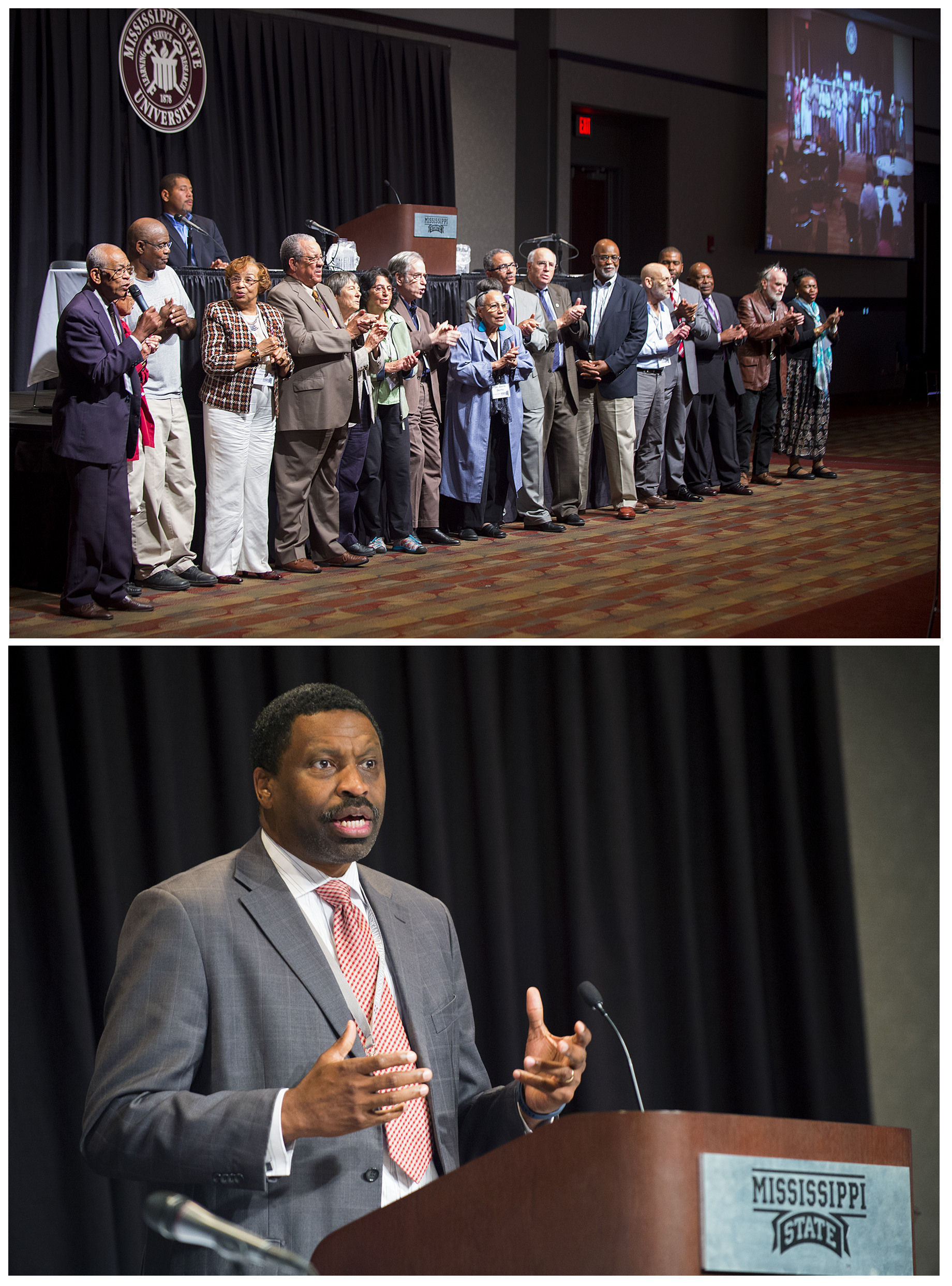Contact: Leah Barbour

Bottom: Mississippi NAACP President Derrick Johnson emphasized how the lessons of Freedom Summer continue to be relevant even 50 years later.
Photo by: Russ Houston
STARKVILLE, Miss.--Building a better future on the foundation of the past was the feature topic of Mississippi State University's "Remembering Freedom Summer: Building a Better Future" conference on Tuesday [Oct. 21].
The three-day gathering, held Oct. 19-21 and hosted by MSU's African-American Studies program, allowed participants and young people the chance to celebrate and honor the Mississippi Freedom Project, also known as Freedom Summer.
Fifty years ago, the Magnolia State had the smallest percentage of African-American voters in the nation, so volunteers, mostly college students from the north, came to help register Mississippi blacks to vote. MSU hosted more than 20 of the civil rights activists whose courage and determination played an important role in registering blacks to vote in 1964.
"Always stand up against injustice, and never be silent in the face of it," said Mark McPhail, dean of the College of Arts and Communication at University of Wisconsin-Whitewater. "Black or white, all of the people in this room can learn that lesson from that moment in history that changed us all--Freedom Summer."
Freedom Summer activist Dave Dennis, also a 1961 Freedom Rider, repeatedly emphasized that modern youth need to learn the lessons of the past. After he met an African-American student who didn't know what Freedom Summer was, he challenged the more than 100 Starkville High School students in attendance to get motivated and make the world a better place.
"The volunteers, the staff and the people within Mississippi that worked that Freedom Summer--they were involved in serious stuff, and they deserve all the credit and praise," Dennis said. "But, it's the young people who are our future. I do have hope, and what gives me hope is when I sit down and talk with the young people."
Fifty years ago, volunteers and locals in Mississippi mobilized to make four major civil rights all inclusive, said Mississippi NAACP President Derrick Johnson. Adequate education, quality healthcare, workers' rights and voting rights drove the oppressed individuals, as well as their advocates, to demand change.
"Those were the four issues that these individuals worked on because they believed in the contract called the Constitution, and we stand here today, 50 years later, still in need of protecting, preserving or expanding those same basic rights," Johnson said.
To create those changes, people must act, said Bill Scaggs, president of The Montgomery Institute. By respecting others and maintaining personal discipline and a personal belief in equality, revolution is possible.
"We need to look back in order to look forward," said Kristal Moore Clemons, assistant professor at Florida A&M University. "We build a better future by learning from our past. Our high school students know it is not too early to start, so whatever it is you're passionate about, be a part of that conversation. Use social media to find ways to meet up, and then, find ways to engage one another.
"You already have what you need to make it work."
Freedom Summer activist Wilbur Colom, attorney and founder of Colom Law Firm, emphasized, while improvements have been made, the struggle for equal education, healthcare, employees' rights and voters' rights is not over.
"As long as people are being excluded and marginalized, that's who we want to protect, and those are the rights we want to defend," he said.
The fight for equality does not rest on the shoulders of one person, but of all people, Johnson said. When the action becomes collective, the people with power have no choice but to listen, and change will come.
"We are very fortunate in our community to have a group of historical figures that stood up for something that was right," said Starkville Mayor Parker Wiseman. "I hope we are all emboldened with the courage to do our part and make this world a better place."
MSU alumna and author Susan Follett spoke during the conference's closing session about the use of inquiry-based teaching methods for passing down the lessons of history to today's students and those in the future.
"Building a better future goes beyond remembering," Follett said, noting that some do not know the history in the first place.
She recalled her own journey of having been "protected" from many of the realities of the Civil Rights era through a period of inquiry and discovery about the truths of the time and place in which she grew up--Meridian, Mississippi, during desegregation.
Now, she said she advocates for the full teaching of history utilizing story-based resources, including memoir, poetry and authentic historical fiction to paint a picture of historical realities.
"Reach students at the heart," she said.
For more on the university's African-American Studies program, visit www.aas.msstate.edu.
MSU is online at www.msstate.edu, facebook.com/msstate, instagram.com/msstate and twitter.com/msstate.